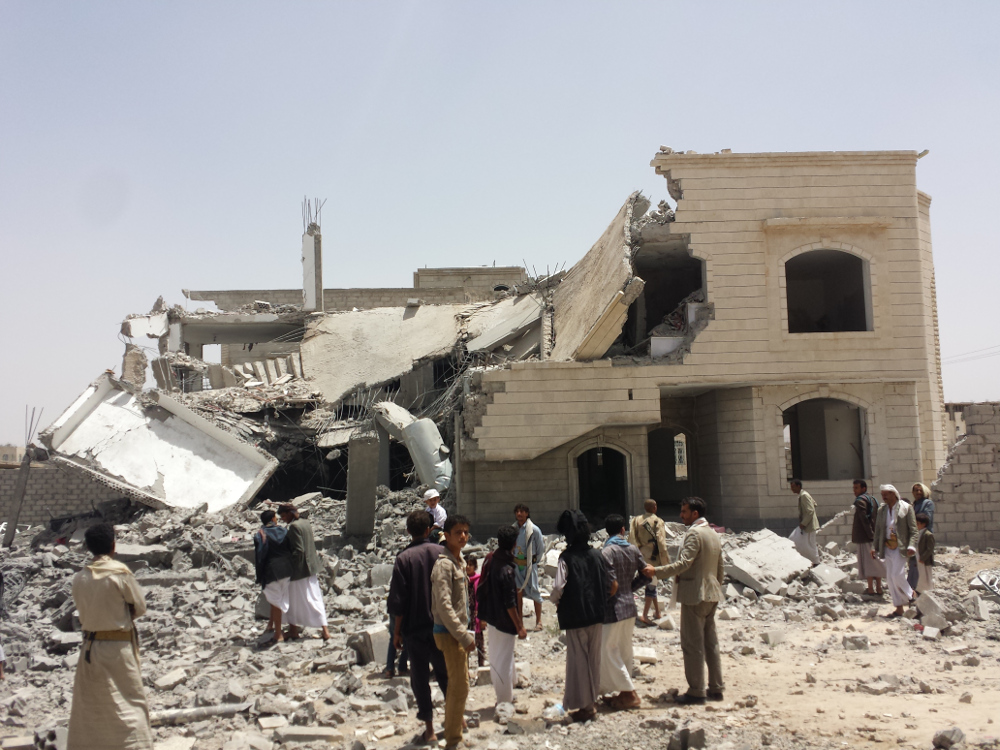by Dina Esfandiary and Ariane Tabatabai
The news out of Yemen continues to be grim. Week after week the Gulf Cooperation Council (GCC) countries that committed troops to the Saudi-led Operation Restore Hope—previously dubbed Operation Decisive Storm—see body bags return home. And they aren’t getting any closer to their goal of a “decisive victory” against Iran and what they see as Tehran’s proxy, the Houthis.
Instead, Yemen’s central authority collapsed, further paving the way for terrorist organizations like al-Qaeda in the Arabian Peninsula and the Islamic State (ISIS or IS) to gain ground. In the ensuing humanitarian crisis, thousands have died.
While the GCC pays a heavy price for an increasingly elusive victory, Tehran sits back and watches the Saudis play into its hands. In order to resolve this crisis and pave the way for the resolution of other crises in the region, Iran and Saudi Arabia must negotiate over Yemen.
Operation Decisive Storm began in 2015, as it became clear that Iran would reach a nuclear deal with the world powers. The GCC interpreted the emerging deal as another step in Washington’s abandonment of the Gulf Arabs, a fear that began with the Arab Spring. At the time, the Obama administration accepted the Saudi policy in Yemen as an effort to get the GCC onboard with the nuclear deal.
The GCC pursues several intertwined goals in Yemen. First, it aims to check Iran—and where better then Yemen? The country is in the GCC’s own backyard, and it represents an easier fight than Iraq or Syria, where Tehran has an advantage. Second, the GCC wants to limit the influence of the Houthis, perceived as one of Iran’s proxies. Without its intervention, the GCC feared, the Houthis would become a Yemeni Hezbollah, giving Iran more influence in the Arab world—and in the GCC’s own backyard.
Meanwhile, Iran watched events unfold in Yemen. Although it certainly provided the Houthis with weapons, financial support, and training—both directly and indirectly via Hezbollah—the extent of Iranian involvement in Yemen is greatly exaggerated.
As months passed, neither GCC goal in Yemen was met, and the decisive victory it hoped for was nowhere in sight.
As a result, the focus of the fight changed, at least on paper, and a number of disagreements began to emerge. The United Arab Emirates (UAE), a major contributor to military efforts in Yemen, witnessed a greater number of body bags returning home and for no good reason. Abu Dhabi also became increasingly aware of the limits to its own strength and capabilities. The Qataris too were becoming resentful of the campaign, despite their lesser involvement. What’s more, with the nuclear deal under its belt, Iran began to look for business opportunities, and Qatar, Kuwait, and the UAE were well positioned to reap the benefits of Iran’s economic reintegration.
Today, with the ongoing conflict in Yemen, the civil war in Syria, the continued presence of IS in Iraq and Syria and the international community’s inability to defeat the group, and now the coup in Turkey, the Middle East is more volatile than it was when Operation Decisive Storm started over a year ago. And the lack of dialogue between the two key players in the region, Riyadh and Tehran—who severed diplomatic ties in January 2016 when Iranian hardliners sacked the Saudi embassy in response to the execution of a Shia cleric—has only entrenched the stalemate in the region. But the key to unlocking regional security could lie in Sana’a.
Yemen is a high priority for Riyadh, and a low priority for Tehran. This makes it the lowest hanging fruit for a new and meaningful regional security dialogue. Although Saudi Arabia opposes the idea of talking about “Arab affairs” with Iran, sooner or later it will have to face the reality that the prolongation of its campaign in Yemen is creating tensions and divisions within the GCC and draining its resources at a time of economic difficulty. The campaign also comes with a heavy price for Saudi credibility and image. For its part, although Iran doesn’t directly suffer from the developments in Yemen, it sees the worsening of the broader regional situation and growing instability as a threat.
Far from controlling four Arab capitals—as Iranian hardliners claim and Gulf Arabs repeat—Iran has varying degrees of influence in each of them, with the least influence in Sana’a. But Iran loses all influence if those capitals collapse entirely. To prevent a power vacuum, Riyadh must abandon its zero-sum approach to regional security, and Tehran must help alleviate Saudi concerns. In order to do that, the two countries should begin by discussing Yemen.
Dina Esfandiary (@DEsfandiary) is a MacArthur Fellow in the Department of War Studies, King’s College London. Before joining War Studies, she spent five years at IISS, where she was a Research Associate. Ariane Tabatabai (@ArianeTabatabai) is a Visiting Assistant Professor in the Security Studies Program, at the Georgetown University School of Foreign Service. Before joining the Security Studies Program, she was a Stanton Nuclear Security Fellow (2013-14) and an Associate (2014-15) at the Harvard Kennedy School’s Belfer Center for Science and International Affairs.
This article is drawn from a piece the authors published in the summer 2016 issue of Washington Quarterly. Photo: house in Sana’a destroyed by airstrike.






A disastrous idea. Any Iranian involvement would increase Saudi paranoia.
The people of Yemen would be the ones who would suffer from it.
Have the authors asked any Yemeni if THEY want to be the object of negotiations between two hostile regional powers?